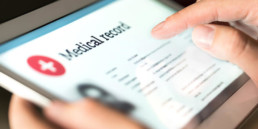Since blockchain has continually proven itself not only as an emerging technology, but as an established one in a variety of industries and sectors, it’s only natural that doctors and hospital administrators find themselves wondering how they can utilize the technology to improve the way they serve patients and communicate with other organizations. The good news is that using blockchain for healthcare and the industry’s needs promises to offer healthcare organizations just that.
An Intro to Blockchain
For the uninitiated, blockchain is a decentralized, public digital ledger which records transactions and links them together using hashing—a process which encodes the transaction—and borrows the data from the previous transaction. The data from the transaction and borrowed data from the one before it is put into a box called a “block.” Since the data in one block also refers to the one before it, the data is “linked” together in a chain. This chain structure also makes the ledger hack-resistant: in order to corrupt the data on the chain, the hacker would need to edit every block in the sequence to hijack it. Since blockchains can have millions of blocks, it’s very difficult to edit all the blocks unnoticed.
Blockchain for Healthcare
Healthcare organizations need to adapt quickly to changes in technology and patient needs. The best healthcare providers use the most advanced technologies available to improve patient outcomes and their overall processes. The healthcare system is taking a more patient-oriented approach—the patient is more mobile and providers are more specialized. Patients, therefore, need accessible services and resources at any given time.
So, now that we’ve summarized what blockchain is and some of the challenges healthcare providers are facing, here are 3 of benefits blockchain offers to them:
Supply Chain Transparency
It’s no secret that, at the time of this writing, the supply chain is still in a state of flux in the wake of the COVID-19 pandemic and that blockchain is poised to provide the solutions we need to work out the kinks. For many of the same reasons we outline here, blockchain can also help medical practitioners.
Blockchain for HealthcareIn the medical field’s supply chain, the primary challenge is transparency—especially as it concerns pharmaceuticals. While the global supply chain has connected us, it has also made the process of verifying the authenticity and origin of prescription drugs more complicated. This is especially important when we consider how many deaths are caused by counterfeit medicines.
So, how can we fix this? Companies and patients must be able to track every movement the medicine takes from its origin, to manufacturers, to wholesalers, to the pharmacist. Blockchain enables all interested parties to track and verify the medicine’s authenticity, expiration dates, and other information.
Here’s how:
- When the manufacturer makes the drug, its packaging is marked with a unique code. The code is scanned and put onto the blockchain.
- When the drug arrives at the wholesaler, the code is scanned, and the origin of the drug is verified. The wholesaler then adds this verification to the blockchain.
- Next, when the pharmacy gets the drug, it’s scanned again: this doublechecks the wholesaler’s verification and proves the drug’s origin. This verification is also added to the blockchain.
- Finally, when the drug is in the patient’s hands, he or she can scan the drug’s code to confirm receipt but also to see where the prescription has been and how it’s been verified.
In these four steps, the blockchain has provided transparency and accountability for everyone involved in the drug’s manufacturing and distribution.
Data Security and Data Sharing
As explained earlier, blockchain provides a robust, tamper resistant data security solution to businesses in every sector, and the healthcare sector is no exception. Healthcare facilities, though, are one of the favorite targets of cybercriminals. In 2021, for example, there were nearly 700 hospitals targeted by breaches in the US alone—affecting approximately 45 million people. Therefore, keeping medical data safe is one of the paramount reasons why healthcare providers should turn to blockchain.
Data security isn’t the only application blockchain offers medical facilities. Equally important is the facilities’ ability to share relevant data with each other—especially considering the mobility patients now enjoy allowing them to visit specialists who need to be able to understand the patient’s history.

In the healthcare system as it is, maintaining patient health records is disjointed and constricted. This is because there is no shared architecture and unified standard for how to store and share sensitive information. To summarize a past blog about data sharing, blockchain reduces these inefficiencies and increases collaboration between organizations. For healthcare providers, being able to share electronic health records (EHR) between specialists helps them provide better care to patients at any point in the treatment process.
Accountability in Clinical Trials
One of the central pillars of medical science is clinical trials to identify whether a treatment or medication is safe and effective for patients to receive in the real world. Scientists rely on the accuracy of the data to determine the outcome of the clinical trial they’re working on.
Data collected during the trial should be authenticated so the scientists, pharmaceutical companies, and policymakers can be confident in the results collected. Using blockchain instills greater transparency and accountability to the interested parties. The blockchain becomes a tool for verifying the reports and the results of the trial, which reduces the risk of accidental or fraudulent conclusions. When these trials are conducted better, patients benefit.
This is by no means a comprehensive list of benefits blockchain offers to healthcare providers. In fact, contract management, health insurance, and healthcare regulations all stand to benefit from the solutions blockchain offers to them. There will always be challenges in the medical field, but these challenges should be focused on accurate diagnosis and treatment for patients, not on identifying counterfeit drugs and transferring paperwork between specialists. For more on how SIMBA is already working with healthcare providers, check out our partnership with Equideum and contact us.